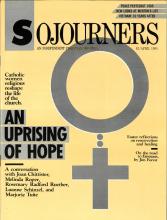My prayers and feelings of disbelief were broken by an emergency room attendant who offered us the precious gift of five minutes with Millie. From beneath a morphine fog, she said with a smile, "I guess this is part of my spiritual journey. My struggle has been to give up my need to control. I think somehow I'm learning that tonight ..." That was the last thing we heard from her for five and a half hours.
Millie was taken away to the heart catheterization lab. We knew little about what was happening, but after a couple of hours we were able to get a message to her through a nurse: "Please tell Millie that the whole community has gathered in our prayer room. They're all praying throughout the whole procedure." The nurse reported back that getting that message was the most hopeful point for Millie in a very rugged night.
At about 1:30 a.m. the cardiologist appeared and explained that a major artery leading to Millie's heart had a 90 percent blockage. A blood clot had become lodged there, resulting in the heart attack. He had managed to dissolve the clot, relieving some of the pressure and pain, but the 90 percent blockage remained. Our persistent question, "Is she out of danger yet?" wasn't to be answered affirmatively for a long time.
We were told by her doctors that Millie had been headed for a massive heart attack and that her quick arrival at the hospital had saved her life. We were learning to take things a day at a time. By Wednesday she was somewhat stabilized—though her heart monitor showed her pulse shot up 20 beats when we were allowed in to visit. By Thursday she was passing out copies of Sojourners to her nurses.
Read the Full Article

